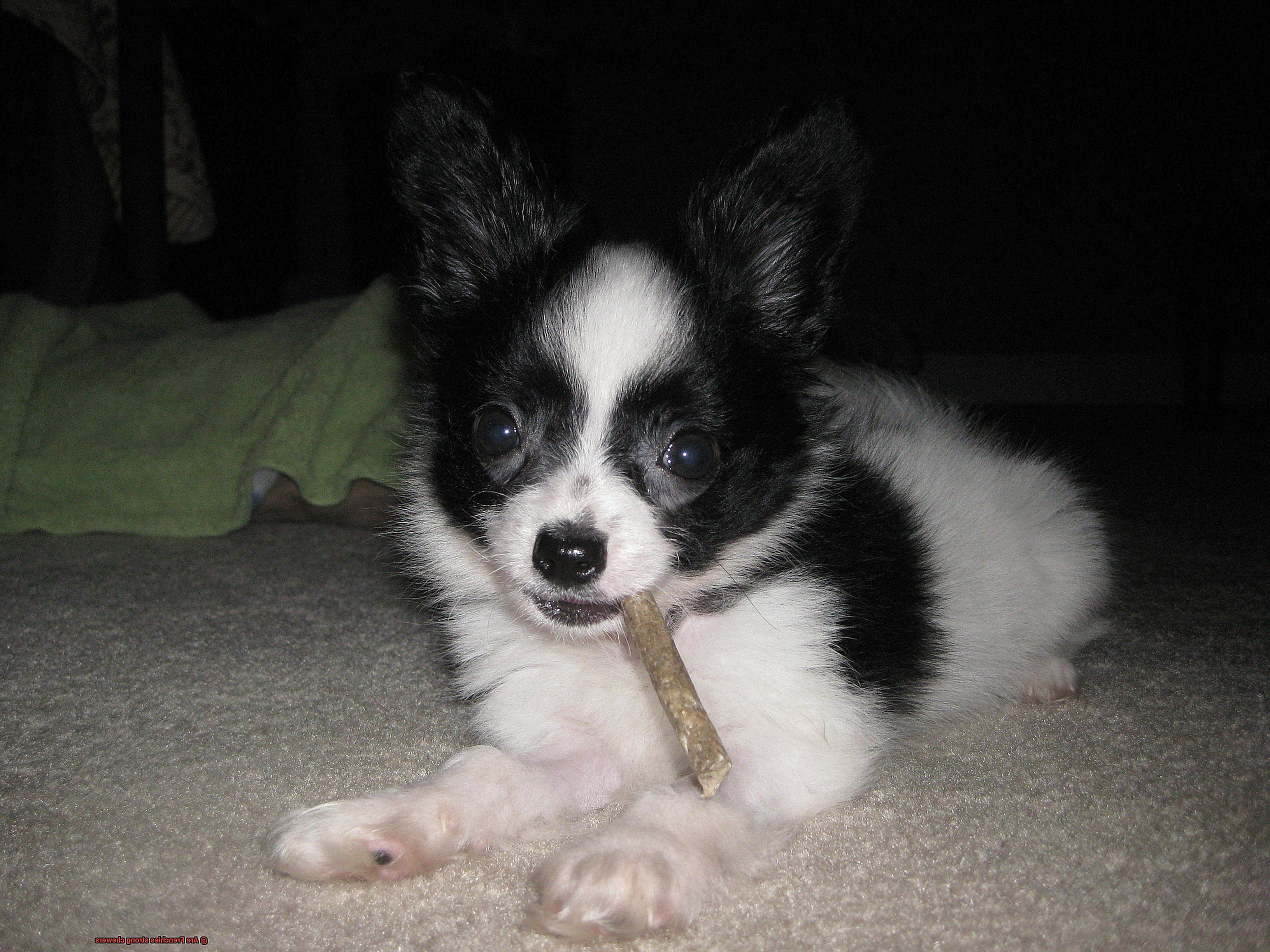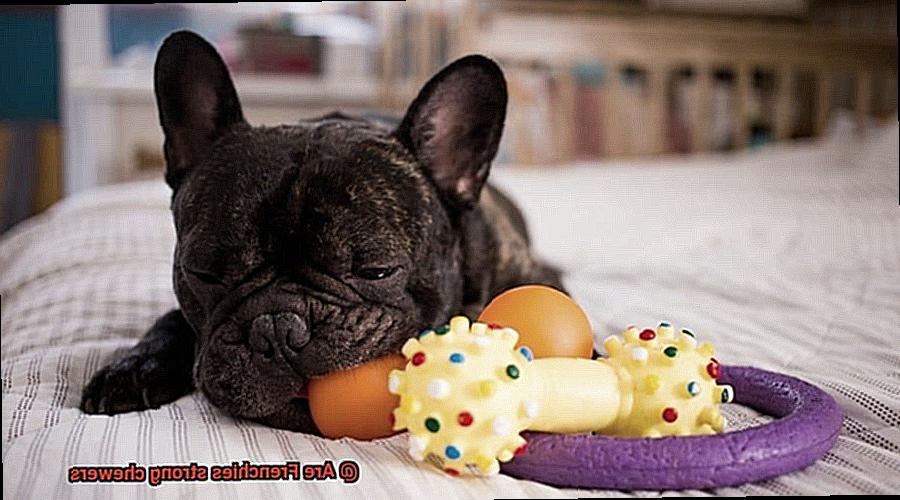Are Frenchies strong chewers?
French Bulldogs, with their perky ears and expressive eyes, have captured the hearts of dog lovers worldwide. These pint-sized pups may seem gentle and delicate, but don’t let their adorable appearance fool you. When it comes to chewing, Frenchies are surprisingly strong-willed and powerful. So, if you’re wondering whether Frenchies are strong chewers, you’ve come to the right place.
Beneath their cuddly exterior lies a deep-rooted urge to gnaw on anything they can get their paws on. This behavior can be traced back to their working breed lineage as rat catchers. Their ancestors relied on chewing to alleviate stress, boredom, and anxiety in their demanding jobs. As a result, French Bulldogs have inherited this trait and can become quite formidable chewers themselves.
But fear not. In this blog post, we’ll dive into the reasons behind Frenchies’ chewing tendencies and provide practical tips for managing their habits. Whether you’re a proud Frenchie owner or simply curious about these charming little dogs, we aim to give you a comprehensive understanding of why French Bulldogs love to chew. So buckle up and get ready to uncover the truth about these furry chewing machines.
The Anatomy of a French Bulldog’s Jaw
Contents
- 1 The Anatomy of a French Bulldog’s Jaw
- 2 The Temperament of Frenchies
- 3 Chewing Habits of French Bulldogs
- 4 Are Frenchies Strong Chewers?
- 5 Tips for Managing the Chewing Behavior of French Bulldogs
- 6 How to Reduce Excessive Chewing in French Bulldogs
- 7 Mental Stimulation and Exercise for French Bulldogs
- 8 Teething and Its Impact on Chewing Behavior
- 9 Conclusion
In this blog post, we delve into the anatomy of a French Bulldog’s jaw and how it contributes to their reputation as powerful chewers.
Brachycephalic Features:
French Bulldogs have a unique facial structure with short snouts and flat faces. This brachycephalic anatomy can impact their jaw alignment and position, resulting in a slightly undershot bite where the lower jaw protrudes beyond the upper jaw. This feature gives them an advantage when it comes to applying force while chewing.
Compact and Muscular Jaws:
Despite their small size, French Bulldogs possess incredibly strong and muscular jaws. The well-developed muscles surrounding their jaw provide them with the power needed for chewing. This strength allows them to exert considerable pressure, making them capable of tackling tough chew toys.
Dental Arrangement:
French Bulldogs have a full set of 42 teeth, including incisors, canines, premolars, and molars. Each type of tooth has a specific function in the chewing process. The incisors are used for grasping and nibbling, while the premolars and molars are responsible for grinding and crushing food. This well-arranged dental structure contributes to their ability to break down and consume various types of food or toys.
Instinctual Behaviors:
French Bulldogs have retained some instinctual behaviors from their bulldog ancestry. Originally bred for bull-baiting, these traits manifest in their desire to explore objects with their mouths. As a result, they may exhibit strong chewing tendencies as they interact with their environment. Providing appropriate chew toys can help redirect this behavior while satisfying their natural instincts.
The Temperament of Frenchies
French Bulldogs, or Frenchies as we like to call them, are not just adorable, snorting companions. Behind those wrinkly faces and bat-like ears lies a hidden power that can bring even the toughest chew toys to their knees. So, what makes these little furballs such strong chewers? Let’s dive into the world of French Bulldog jaws and uncover the secrets.
Mighty Jaws:
Frenchies may be small in size, but their jaws are a force to be reckoned with. Their compact yet muscular jaws pack a punch when it comes to chewing. Thanks to their brachycephalic (short-muzzled) face structure, their jaws have a powerful grip that can make even the most durable chew toy tremble in fear.
Dental Marvels:
Have you ever noticed how perfectly aligned a Frenchie’s teeth are? That’s no coincidence. French Bulldogs have well-arranged dental arrangements, which allows for efficient chewing power. Their sharp little teeth are designed to tear through meat and bones, making them natural-born chewers.
Instinctual Behaviors:
French Bulldogs have inherited some primal instincts from their ancestors, who were mighty hunters in the past. These instincts drive them to chew on objects to explore their environment and relieve stress or anxiety. It’s their way of keeping their jaws sharp and their minds occupied.
Teething Troubles:
Just like human babies, Frenchies go through a teething phase that can turn them into chewing machines. During this stage, their gums may feel itchy and uncomfortable, making them seek relief by chewing on anything they can sink their teeth into. Providing appropriate teething toys can help save your shoes from becoming their teething targets.
Personality Plays a Role:
Every Frenchie has its own unique personality, and that can affect their chewing tendencies. Some Frenchies may be more prone to intense chewing due to their adventurous and curious nature, while others may be content with gentler nibbles. Understanding your Frenchie’s individual temperament can help you gauge their chewing habits and provide appropriate chew toys.
Chewing Habits of French Bulldogs

French Bulldogs are known for their strong jaws and tenacious nature, making them formidable chewers. Let’s explore the various factors that contribute to their chewing habits and learn how to keep their chewing tendencies in check.
Teething Troubles: A Rite of Passage
During their teething phase, French Bulldogs experience discomfort and itching in their gums as their baby teeth are replaced by permanent adult teeth. This can lead to excessive chewing as they seek relief. To protect your belongings, provide appropriate chew toys or treats designed for teething puppies. This not only soothes their gums but also redirects their chewing behavior.
Energy Unleashed: Playtime as a Chew-Prevention Measure
French Bulldogs are playful and energetic by nature. If they don’t receive enough mental and physical stimulation, they may resort to destructive chewing to release their pent-up energy. Engage them in regular exercise and interactive playtime to prevent this behavior.
Stress and Anxiety: Chew Therapy for Calming Down
French Bulldogs have an affectionate and sensitive nature, making them prone to stress and anxiety. Changes in their environment or routine can trigger destructive chewing. Combat this by providing comforting toys and creating a calm atmosphere. Additionally, consider crate training or hiring a dog sitter to minimize separation anxiety-induced chewing when you’re away.
Redirecting the Chew: Toys that Stand the Test of Time
Instead of trying to eliminate chewing entirely, redirect it towards appropriate items. Invest in durable chew toys specifically designed for strong chewers like French Bulldogs. Rotate these toys regularly to keep them engaged and prevent boredom-induced chewing.
Are Frenchies Strong Chewers?
French Bulldogs, or as we like to call them, Frenchies, are adorable little bundles of energy with a mischievous side. But when it comes to chewing, are they strong contenders? Let’s find out.
Teething Troubles: A Rite of Passage
Just like human babies, French Bulldog puppies go through a teething phase. During this time, their gums can become sore and itchy, leading them to chew on anything they can sink their teeth into. From shoes to furniture legs, nothing is safe from their tiny but mighty jaws.
Energy Unleashed: The Power of Play
Frenchies are known for their playful nature and boundless energy. If they don’t get enough exercise or mental stimulation, they may turn to chewing as a way to release their pent-up energy. So, if you come home to find your favorite pair of socks in shreds, it might be a sign that your Frenchie needs some playtime.
Stress and Anxiety: Chew Therapy
Just like humans, dogs can experience stress and anxiety. And chewing can be a therapeutic outlet for them. If your Frenchie is feeling anxious or stressed, they may resort to chewing as a way to calm themselves down. Identifying the source of their stress and addressing it can help curb their chewing habits.
Redirecting the Chew: Toys to the Rescue
Now that we’ve established that Frenchies have a propensity for chewing, how do we protect our shoes and furniture? The answer lies in providing them with appropriate chew toys. Look for toys made specifically for small or medium-sized dogs that are durable and designed to withstand moderate chewing. It’s also a good idea to rotate their toys regularly to keep them engaged and prevent boredom.
In a Nutshell
While some French Bulldogs may have a stronger urge to chew than others, it is not a characteristic that can be attributed to the entire breed. Understanding the reasons behind their chewing habits, providing appropriate chew toys, and ensuring they get enough exercise and mental stimulation are key to managing their chewing behavior.
Tips for Managing the Chewing Behavior of French Bulldogs
French Bulldogs are adorable and lovable companions, but they can also have a mischievous side when it comes to chewing. However, with the right strategies and guidance, you can effectively manage their chewing behavior. In this blog post, we will explore some helpful tips and tricks to keep your French Bulldog’s chewing habits in check.
Provide Appropriate Chew Toys:
French Bulldogs have a natural instinct to chew, so it’s important to provide them with appropriate chew toys. Look for toys that are durable, safe, and specifically designed for strong chewers.
Avoid giving them old shoes or household items, as this can encourage them to chew on inappropriate objects. Remember to rotate the toys regularly to keep your French Bulldog interested.
Supervision and Redirection:
Supervising your French Bulldog when they are chewing is crucial. This way, you can ensure they don’t swallow any small or hazardous parts of their toys. If you catch your furry friend chewing on furniture or other household items, calmly redirect their attention to an appropriate chew toy and praise them when they choose to chew on it instead.
Physical Exercise and Mental Stimulation:
A tired dog is a happy dog. Providing plenty of physical exercise and mental stimulation for your French Bulldog can help reduce their chewing behavior. Take them for daily walks or engage them in active play sessions. Puzzle toys or treat-dispensing toys can also keep their minds occupied and prevent boredom-related chewing.
Consistency is Key:
Consistency is crucial in managing your French Bulldog’s chewing behavior. Make sure everyone in the household enforces the same rules about what your pup is allowed to chew on. This will prevent confusion and reinforce proper chewing habits.
Seek Professional Guidance if Needed:
If your French Bulldog continues to exhibit excessive chewing behavior despite following these tips, it may be helpful to consult with a veterinarian or professional dog trainer. They can provide further guidance and training techniques tailored to your specific situation.
How to Reduce Excessive Chewing in French Bulldogs
French Bulldogs are adorable and lovable companions, but they can also be prone to excessive chewing. If you’re a Frenchie owner who’s tired of finding your furniture and shoes destroyed, don’t worry – there are ways to address this behavior. In this blog post, we’ll discuss some practical tips to reduce excessive chewing in French Bulldogs.
Understand the Reasoning Behind Chewing:
Chewing is a natural instinct for dogs, and French Bulldogs are no exception. They may chew due to teething discomfort, boredom, anxiety, or even lack of exercise. Understanding the underlying reasons for their chewing behavior will help you address it effectively.
Provide Appropriate Chew Toys:
One of the best ways to redirect your Frenchie’s chewing is by offering them suitable chew toys. Look for toys made of durable materials like rubber or nylon that can withstand their strong jaws. Avoid toys with small parts that can be easily swallowed.
Keep Them Mentally Stimulated:
French Bulldogs are intelligent dogs that need mental stimulation to stay happy and content. Provide puzzle toys or treat-dispensing toys that require problem-solving skills to keep their minds engaged and divert their attention from destructive chewing.
Regular Exercise is Key:
French Bulldogs have moderate exercise requirements, so make sure they get enough physical activity every day. Take them for walks, play fetch, or engage in interactive games to burn off excess energy and reduce boredom-related chewing.
Supervision and Redirection:
Keep a close eye on your Frenchie, especially during the early stages of training. If you catch them chewing on inappropriate items, gently redirect their attention to an appropriate chew toy and praise them when they chew on it instead.
Seek Professional Help if Needed:
If your Frenchie’s excessive chewing persists despite your efforts, consider consulting with a professional dog trainer or behaviorist. They can provide personalized guidance and help address any underlying issues that may be contributing to the behavior.
Mental Stimulation and Exercise for French Bulldogs
French Bulldogs are known for their playful and energetic nature, making mental stimulation and regular exercise crucial for their overall well-being. In this blog post, we will explore the importance of both mental stimulation and exercise for French Bulldogs, and provide practical tips to keep your Frenchie happy and healthy.
Mental Stimulation
- Preventing Destructive Behavior: French Bulldogs are intelligent dogs that require mental challenges to keep them engaged and prevent boredom. Providing mental stimulation helps prevent destructive behaviors, such as excessive chewing.
- Puzzle Toys: Engage your Frenchie’s problem-solving skills with puzzle toys that hide treats or food inside. This not only keeps them mentally stimulated but also satisfies their natural instinct to forage and hunt.
- Training Sessions: French Bulldogs are highly trainable and enjoy learning new commands and tricks. Regular training sessions provide mental stimulation while strengthening the bond between you and your Frenchie.
- Interactive Games: Tap into your Frenchie’s curiosity with games like hide-and-seek or treasure hunts. These games encourage them to use their senses to find hidden objects or treats.

Regular Exercise
- Preventing Obesity: While not as high-energy as some other breeds, French Bulldogs still need daily exercise to prevent obesity and maintain muscle tone.
- Walks: Aim for at least one or two walks a day, lasting around 20-30 minutes each. Walking provides physical exercise while allowing your Frenchie to explore their surroundings and socialize with other dogs.
- Fetch: Keep your Frenchie moving with short sessions of fetch. Provide plenty of breaks as they may not have the endurance for long games.
- Swimming: Consider taking your Frenchie for a swim if you have access to a pool or safe body of water. Swimming is a low-impact exercise option that is gentle on their joints.
- Heat Regulation: French Bulldogs are brachycephalic dogs and can struggle with heat regulation. Be mindful of their breathing and provide plenty of water breaks, especially when exercising in hot weather.
Teething and Its Impact on Chewing Behavior
Teething is a natural process that all puppies, including French Bulldogs, go through. It typically starts around three to four months of age and can last until they are six to eight months old.
During this time, your Frenchie may experience discomfort and itchiness in their gums as their baby teeth start to fall out and adult teeth begin to emerge. This process can have a significant impact on their chewing behavior, but fear not. We’ve got you covered with some tips and tricks to manage this behavior.

Understanding the Impact of Teething on Chewing Behavior:
During the teething phase, your Frenchie’s gums may be sore and tender, leading them to seek relief through chewing. This behavior is completely normal and should be expected. However, it is essential to redirect their chewing behavior towards appropriate items.
Providing Appropriate Chew Toys:
To alleviate the discomfort, it is crucial to provide your Frenchie with appropriate chew toys. Look for toys specifically designed for teething puppies, as they are made of softer materials that are gentle on their gums. Avoid toys that are too hard or small, as they may cause damage or pose a choking hazard.
Reinforce Positive Chewing Behavior:
Instead of scolding or punishing your Frenchie for chewing during the teething phase, redirect their attention to the appropriate chew toys. Whenever you catch them chewing on an approved item, praise them and offer treats or affection to reinforce positive chewing behavior.
Deter Inappropriate Chewing:
To prevent your Frenchie from chewing on furniture or household items, make sure these objects are out of their reach. Use baby gates or crate training to limit their access to certain areas of the house. Additionally, you can use bitter-tasting sprays or deterrents on objects you don’t want them to chew on.
Managing Excessive Drooling:
During the teething phase, your Frenchie may experience increased drooling due to the stimulation of their salivary glands. To manage this, keep a towel or cloth handy to wipe their mouth regularly. Providing access to fresh water throughout the day is also essential to prevent dehydration caused by excessive drooling.
Em5WE9QFfa0″ >
Conclusion
French Bulldogs, known affectionately as Frenchies, may not be the strongest chewers in the canine world, but they can still pack a punch when it comes to gnawing on things. These little bulldogs have a reputation for their tenacity and determination, which means they can make short work of toys and other objects if given the chance. Don’t let their small size fool you – Frenchies are like miniature powerhouses when it comes to chewing.
With their strong jaws and sturdy build, Frenchies can easily take on most chew toys. They have an innate desire to explore and investigate their environment through their mouths, so providing them with appropriate chew toys is essential to prevent them from turning their attention to your favorite pair of shoes or household items. It’s important to choose toys that are durable and made specifically for strong chewers.
But beware – Frenchies are also notorious for their ability to find weak spots in even the toughest toys. They will relentlessly gnaw and chomp until they conquer whatever stands in their way. So while they may not be classified as “super chewers,” they certainly possess a formidable chewing strength that should not be underestimated.
To keep your Frenchie entertained and satisfied, it’s crucial to rotate their toys regularly. This prevents boredom and keeps them engaged with different textures and shapes. Additionally, providing interactive puzzle toys or treat-dispensing gadgets can challenge their minds while satisfying their natural urge to chew.
In conclusion, while Frenchies may not be considered the strongest chewers compared to some other breeds, they still have a knack for sinking their teeth into things. Their determination and persistence make them formidable opponents when it comes to chewing on toys or objects around the house. By providing them with appropriate chew toys and engaging activities, you can channel their chewing instincts in a safe and enjoyable way.




